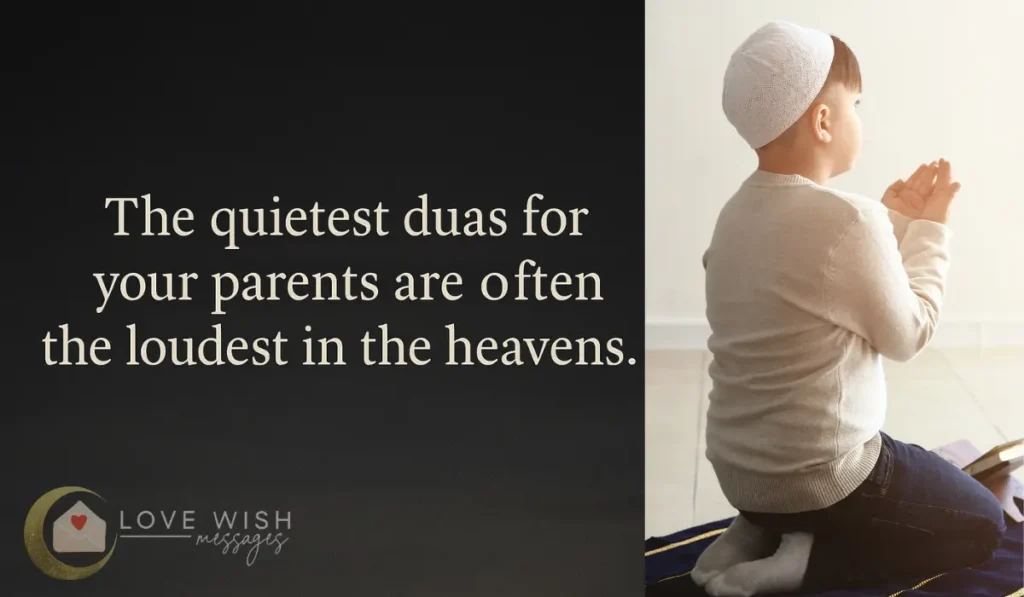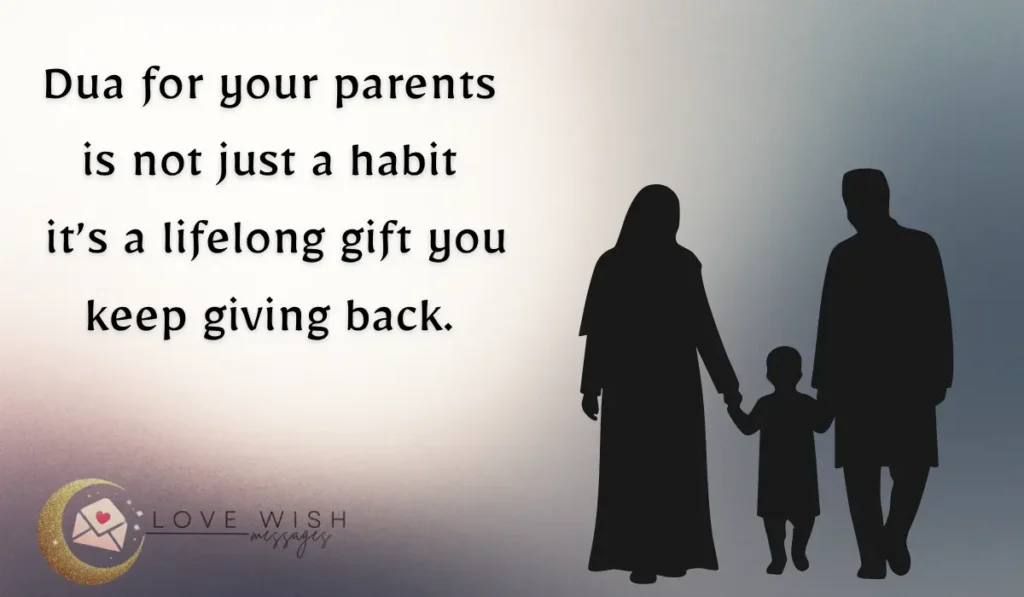What Is the Best Dua for Parents?

You ever just find yourself quietly saying, Ya Allah, take care of my parents? Not even planned. It just slips out. Sometimes when you’re watching them rest. Other times, it’s when you miss them so much it aches. Maybe they’ve passed. Maybe they’re still with you but getting older. Either way, the love stays the same.
And you wonder:
What’s the best thing I can say for them?
Is there something from the Qur’an I should recite?
Can I ask Allah to keep them healthy, to forgive them, to give them peace?
What can I teach my kids to say for their grandparents who aren’t here anymore?
All of it matters. Every word. Every little whisper of dua. In Islam, making dua for your parents isn’t just encouraged—it’s cherished. Whether you’re still young, grown with your own family, or even visiting their grave with tears in your eyes… your dua reaches them. It really does.
So this isn’t just a list of duas. It’s a small guide. A reminder. Of the words you can carry with you. The ones you can say anytime. The ones you can teach your kids. All from the Qur’an, from the Sunnah, from hearts that understand. Love for parents never fades.
In shāʾ Allāh, these words become part of our everyday lives. Quiet. Simple. But powerful.
Why Dua for Parents Matters in Islam
Honoring and praying for our parents is not just a moral act. It is a divine command. Allah ﷻ mentions birr al-wālidayn (righteousness toward parents) immediately after commanding tawḥīd (worship of Him alone).
“And your Lord has decreed that you not worship except Him, and to parents, good treatment.”
(Surah Al-Isra 17:23)
This reveals just how sacred the status of parents is in Islam. And among the most beautiful ways to honor them, whether they’re alive or have returned to their Creator, is to make dua for them.
Why your dua for your parents matters so much:
- It is a form of ongoing sadaqah (ṣadaqah jāriyah) – especially if they’ve passed away.
- It strengthens your connection with them and with Allah ﷻ.
- It brings barakah into your own life and softens your heart.
- It is one of the few actions that continuously benefit the deceased.
“When a person dies, all his deeds end except three: ongoing charity, beneficial knowledge, or a righteous child who prays for him.”
(Sahih Muslim 1631)
That’s why every whisper of “Yā Rabb, forgive my parents” becomes a light in their grave and a ladder in your own akhirah.

Quranic Duas for Parents (Arabic + Transliteration + English)
Among the most beloved and widely recited duas for parents are those found directly in the Qur’an. These verses are not only sacred but also easy to memorize and deeply meaningful.
1. Surah Al-Isra (17:24) – The Core of Parental Mercy
Arabic:
رَّبِّ ٱرْحَمْهُمَا كَمَا رَبَّيَانِى صَغِيرًۭا
Transliteration:
Rabbi irḥamhumā kamā rabbayānī ṣaghīrā
Translation:
“My Lord, have mercy upon them as they brought me up when I was small.”
This is the most famous Quranic dua for parents, asking Allah to show them the same mercy they showed us when we were helpless.
2. Surah Ibrahim (14:41) – A Dua for Forgiveness
Arabic:
رَبَّنَا ٱغْفِرْ لِى وَلِوَٰلِدَىَّ وَلِلْمُؤْمِنِينَ يَوْمَ يَقُومُ ٱلْحِسَابُ
Transliteration:
Rabbana ighfir lī wa li-wālidayya wa lil-mu’minīn yawma yaqūmu al-ḥisāb
Translation:
“Our Lord, forgive me, my parents, and the believers the Day the account is established.”
This is a powerful dua that covers both your parents and the wider ummah, invoking Allah’s mercy on Yawm al-Ḥisāb (the Day of Reckoning).
3. Surah Nuh (71:28) – A Dua for the Living and the Deceased
Arabic:
رَبِّ ٱغْفِرْ لِى وَلِوَٰلِدَىَّ وَلِمَن دَخَلَ بَيْتِىَ مُؤْمِنًۭا
Transliteration:
Rabbi ighfir lī wa li-wālidayya wa liman dakhala baytiya mu’minan
Translation:
“My Lord, forgive me, my parents, and whoever enters my house as a believer.”
This dua shows the Prophet Nūḥ (AS) praying for his parents as well as guests, reflecting the wider mercy and barakah of a believer’s dua.
4. Bonus: Reminder Verse – Surah Luqman (31:14)
“Be grateful to Me and to your parents. To Me is the [final] destination.”
(Surah Luqmān 31:14)
Though not a dua in itself, this verse emphasizes the divine expectation to appreciate parents and tie that gratitude to worship of Allah.
Dua for Parents’ Health, Long Life, and Protection
If your parents are alive, your dua can become their shield. Whether they’re healthy or growing weaker with age, Islam teaches us to pray for their protection, healing, and peace. These prayers are not only acts of love but forms of barakah that bring light to your home.
Sometimes, just whispering “Yā Allāh, keep my parents safe” brings comfort you didn’t even know you needed.
Powerful Dua for Parents’ Health and Long Life
These are not from specific Qur’anic verses or hadith but are authentic in meaning and widely accepted in duʿā’ books and classical supplication literature:
- اللَّهُمَّ أَطِلْ عُمْرَ وَالِدَيَّ فِي طَاعَتِكَ، وَمَتِّعْهُمَا بِالصِّحَّةِ وَالْعَافِيَةِ
Allāhumma aṭil ʿumra wālidayya fī ṭāʿatik, wa mattiʿhumā bi-ṣ-ṣiḥḥati wal-ʿāfiyah
O Allah, lengthen the lives of my parents in obedience to You, and grant them good health and well-being. - “Yā Rabb, protect my parents from every sickness, sadness, and hardship. Keep them strong in body and soul.”
- “O Allah, make their old age easy, bless them with contentment, and protect their hearts from worry.”
- “Allāhumma ajʿal kulli yawmin fī ḥayātihimā barakah, wa kulli sāʿah sakīnah, wa kulli nafas shifāʾ.”
O Allah, make every day in their lives a blessing, every hour a moment of peace, and every breath a cure.
When to Recite These Duas
- After each fardh ṣalāh
- In the early hours of Tahajjud
- During morning and evening adhkār
- When they’re sick or undergoing treatment
- Quietly while they’re sleeping—an unseen form of care
“The best of your deeds is the one done consistently, even if small.” (Sahih al-Bukhari 6465)
A single, heartfelt dua repeated daily can bring more healing than words ever show.
Related Protection Duas
If you’re looking to pray for both spiritual and physical protection for your parents and family, consider learning and reciting the Manzil Dua regularly. It contains powerful verses from the Qur’an for safeguarding from harm.
Read More: Manzil Dua: Meaning & Benefits — a powerful collection of Qur’anic verses for spiritual and physical protection.
This can be recited for your parents’ protection from evil, illness, envy, and spiritual harm.
The Qur’an Gives Us the Words — We Just Have to Feel Them

One of the most well-known duas for parents comes straight from the Qur’an. Short. Simple. But it hits the heart every time:
“رَّبِّ ٱرْحَمْهُمَا كَمَا رَبَّيَانِى صَغِيرًۭا”
“My Lord, have mercy on them, as they raised me when I was small.” (Surah Al-Isra, 17:24)
That one line says everything. It doesn’t ask for riches or long life. Just mercy. The same mercy they showed when you were helpless, messy, crying at 3am, not knowing anything. And they were there. Feeding you. Protecting you. Making dua for you.
Now it’s your turn.
You can say this dua anytime. After salah. While driving. When you’re folding laundry and you suddenly think of your mom. Or when you pass by your father’s chair that’s been empty for a while now.
There’s no rule that says it has to be dramatic. Sometimes the quietest duas are the loudest in the heavens.
Making it a Family Habit
Even children can be taught these simple phrases:
- “Yā Allāh, keep Nana and Nani safe.”
- “O Allah, make my mom and dad healthy forever.”
The sincerity of a child’s dua is unmatched. Encourage your children to include their grandparents in their bedtime duas. It builds love, mercy, and connection across generations.
Dua for Parents Who Passed Away
Losing a parent never truly stops hurting. The grief may quiet, but it doesn’t leave. You find yourself talking to them in your heart, whispering prayers over their grave, or catching yourself saying, “Ya Allah, please forgive them.”
In Islam, that whisper isn’t lost. It is heard. It reaches them. The dua of a righteous child is one of the greatest gifts you can offer your parents after they’ve passed from this world.
“When the son of Adam dies, his deeds come to an end except three: ongoing charity, beneficial knowledge, or a righteous child who prays for him.”
(Sahih Muslim 1631)
That’s you. You can still bring light to their graves.
Quranic Dua for Deceased Parents
These verses from the Qur’an are especially meaningful to recite when praying for your late mother, father, or both:
رَّبِّ ٱرْحَمْهُمَا كَمَا رَبَّيَانِى صَغِيرًۭا
Rabbi irḥamhumā kamā rabbayānī ṣaghīrā
(Surah Al-Isra 17:24)
“My Lord, have mercy upon them as they brought me up when I was small.”
رَبِّ ٱغْفِرْ لِى وَلِوَٰلِدَىَّ وَلِمَن دَخَلَ بَيْتِىَ مُؤْمِنًۭا
Rabbi ighfir lī wa li-wālidayya wa liman dakhala baytiya mu’minan
(Surah Nuh 71:28)
“My Lord, forgive me, my parents, and anyone who enters my house as a believer.”
These duas encompass mercy, forgiveness, and reward for your parents, and they can be recited any time — especially after prayer, during Tahajjud, or while visiting their grave.
Personal Duas in English for Deceased Parents

If Arabic is difficult for you or your children, don’t hesitate to speak from the heart in your own language. Allah ﷻ understands every whisper.
Here are some heartfelt supplications:
- “O Allah, forgive my parents and have mercy on them. Illuminate their graves and grant them peace.”
- “Yā Allāh, make their resting place a garden from the gardens of Paradise.”
- “O Allah, raise their ranks in Jannatul Firdaws, pardon their shortcomings, and reunite us with them in the Hereafter.”
- “My Lord, if I ever made them cry, let my duas now be a cause of joy for them in their grave.”
- “Ya Arhamar Rahimeen, forgive them for every forgotten prayer, every weakness, and every silent pain.”
Recommended Acts with Tahajjud
While your dua is essential, you can increase reward and mercy for your deceased parents by combining it with the following:
- Reciting Qur’an and gifting the reward (e.g., Surah Yasin or Surah Al-Mulk)
- Giving charity on their behalf
- Fasting a voluntary day and gifting the reward
- Sponsoring a well or Islamic education in their name (ṣadaqah jāriyah)
- Making frequent istighfār (seeking forgiveness) for them
These acts align with the goals of this dua, bringing both peace to your parents and closeness between your heart and theirs.
Coping with Grief Through Dua
If your heart still aches with their absence, let dua become your healing. There is a type of patience (ṣabr) that isn’t silent—it cries in sujūd. And there is a love that continues even in death.
You might find comfort in these 459+ Islamic Quotes for Patience & Being Silent as you navigate grief with faith and resilience.
These reflections can bring peace to your heart as you continue to love them through prayer.
Teaching Children Dua for Parents and Grandparents
Even a 5-year-old can learn to say:
“O Allah, forgive my grandparents and give them Jannah.”
Let your child’s small dua become their grandparents’ greatest reward.
When and How to Make Dua for Parents Daily
The most powerful duas aren’t always long or loud. Often, they’re quiet—made in secret, with sincerity. When you pray for your parents consistently, even with simple words, those duas become seeds of mercy that blossom in both this world and the next.
So, when is the best time to make dua for your parents? And how can you make it a habit that lasts?
Best Times to Make Dua for Parents
These moments are especially beloved in Islam for making heartfelt supplications:
1. After the Five Daily Prayers (Salah)
Right after completing your fardh prayers, take a brief pause before moving. Raise your hands and say:
- “Yā Allāh, forgive my parents.”
- “O Allah, have mercy on my mother and father.”
This simple act daily adds up to hundreds of duas a month — and a lifetime of reward.
2. During Tahajjud (Last Third of the Night)
In those quiet hours before dawn, your dua is more likely to be accepted.
The Prophet ﷺ said:
“Our Lord descends every night to the lowest heaven… and says: ‘Is there anyone to call upon Me, so that I may answer him?’”
(Sahih Bukhari 1145, Muslim 758)
Include your parents in your Tahajjud list—especially if they are elderly, sick, or deceased.
3. On Fridays
The Prophet ﷺ told us that Friday has a moment in which no dua is rejected.
“There is a moment on Friday during which if a Muslim is standing in prayer and asks Allah for something, He will give it to him.” (Sahih Bukhari 935)
Make a dedicated Friday habit to pray specifically for your parents.
4. While Visiting Their Graves
If your parents have passed away, visiting their grave is a Sunnah. You can say:
“As-salāmu ʿalaykum yā ahl al-qubūr. Antum salafunā wa naḥnu bil-athar. Allāhumma ighfir lahum.”
“Peace be upon you, O people of the graves. You have preceded us, and we are following after. O Allah, forgive them.”
5. During Ramadan & Laylat al-Qadr
If there’s a night to pour your heart out for your parents, it’s Laylat al-Qadr.
Related: Laylatul Qadr Dua in English — include your parents in your prayers during the Night of Decree for multiplied reward.
How to Make Dua for Parents: Practical Steps
If you’re unsure how to start or teach your children to pray for parents, here’s a simple process:
• Start With Praise
Begin by praising Allah:
- “Alḥamdulillāh, Allāhu Akbar, SubḥānAllāh.”
• Send Salawat on the Prophet ﷺ
- “Allāhumma ṣalli ʿalā Muḥammad…”
• Then Make Your Dua for Parents
- Ask for mercy, forgiveness, health, and Jannah.
- Use Qur’anic duas (like Surah Al-Isra 17:24) and your own heartfelt words.
• Conclude With Ameen
- Say “Āmīn” sincerely and confidently.
Sample Daily Routine: Dua for Parents
Here’s a sample spiritual routine you can follow:
| Time | Action |
|---|---|
| After Fajr | Recite Surah Al-Isra 17:24 for your parents |
| After Dhuhr | Personal dua for their health |
| After Asr | Short istighfar on their behalf |
| After Maghrib | Send salawat + dua for Jannah if deceased |
| After Isha | Gratitude: “O Allah, reward them for every sacrifice they made.” |
| Before Bed | Teach your child one sentence dua for their grandparents |
Make Dua for Parents a Habit, Not a Reaction
Don’t wait until they fall ill. Don’t wait until they leave this world.
Make praying for your parents part of who you are.
Every “Yā Allāh, protect them”
Every “O Allah, forgive them”
Every whisper after salah — it’s all building reward, love, and a legacy that never dies.
“The most beloved actions to Allah are those done regularly, even if they are small.”
(Sahih Bukhari 6465)
If you’d like to reflect more deeply on gratitude and spiritual peace, read Islamic Gratitude, Inner Peace & Blessings.
Tahajjud Duas for Parents
One of the most powerful times to make dua for parents is during Tahajjud, the last third of the night when the world is asleep and hearts are most connected to Allah ﷻ.
The Prophet ﷺ said:
“Our Lord descends to the lowest heaven during the last third of the night and says: ‘Who is calling upon Me, so I may answer him? Who is asking Me, so I may give him? Who is seeking My forgiveness, so I may forgive him?’”
(Sahih al-Bukhari 1145, Muslim 758)
Tahajjud is a sacred time. If there’s any moment to pray for your parents — for their health, forgiveness, or Jannah — it’s then.
Here are examples of Tahajjud Duas for parents:
- “Yā Rabb, in this blessed night, grant my parents good health and long life in Your obedience.”
- “O Allah, in the silence of this night, forgive my parents, raise their ranks, and make their graves gardens from Jannah.”
- “Ya Allah, I stand in prayer while my parents sleep — grant them peace in this world and the next.”
Even if you’re new to Tahajjud, starting with a few heartfelt lines, consistently, can bring immense barakah to your family life.
Related Read:
You may also benefit from reading our guide:
Taraweeh Prayer & Dua – especially if you want to connect deeper with night worship and family duas during Ramadan.
Emotional and Spiritual Benefits of Making Dua for Parents
There’s something deeply healing about making dua for your parents. Whether it’s a quiet prayer in sujūd, a whisper in the car, or a tearful plea after they’ve returned to Allah — that connection never breaks. In Islam, the act of dua is not only about asking. it’s about remembering, connecting, and loving.
Here are some of the emotional and spiritual benefits that come with regularly making dua for parents.
1. It Softens Your Heart
Dua nurtures empathy. When you regularly pray for your mother’s peace, or your father’s strength, your heart naturally softens toward them. It builds compassion, patience, and understanding — even in moments of tension or distance.
2. It Strengthens Family Bonds
Even if you live far apart, or if time and life have created emotional gaps, dua bridges the distance. Praying for your parents — alive or deceased — keeps them present in your heart and mind. It becomes an act of spiritual closeness, even when physical closeness isn’t possible.
3. It Brings Barakah into Your Life
One of the hidden blessings of making dua for parents is that it invites barakah into your own affairs. When you ask Allah to heal your parents, you may find healing in your own life. When you seek forgiveness for them, your own sins may be forgiven.
“And your Lord has decreed that you not worship except Him, and to parents, good treatment.”
(Surah Al-Isra 17:23)
That divine pairing shows us that righteousness toward parents leads to the pleasure of Allah ﷻ, and nothing brings barakah like that.
4. It Gives Peace to the Grieving Heart
For those who have lost their parents, making dua is one of the most comforting acts. You may no longer be able to speak to them. But you can still speak for them. And that changes everything.
Saying:
- “Yā Allāh, forgive my mother.”
- “O Allah, grant my father light in his grave.”
…becomes a way to continue loving them beyond the limits of this dunya.
If you’re struggling with grief, you may find comfort in this heartfelt collection:
459+ Islamic Quotes for Patience & Being Silent
5. It Ensures You’ll Be Remembered Too
There’s a beautiful truth in Islam: what you give comes back to you. If you make dua for your parents today, your children may one day do the same for you. It’s the beginning of a chain of mercy that can continue for generations.
6. It Counts as Sadaqah Jariyah
Every time you make dua for parents, especially if they’ve passed away, you’re investing in their ongoing reward.
Whether you say:
- “O Allah, forgive them.”
- “Yā Rabb, elevate their status in Jannah.”
- “Make their grave a garden from the gardens of Paradise.”
…you are building light in their hereafter, and your own.
FAQs about Dua for Parents
1. What is the best dua for parents in Islam?
The most well-known and powerful dua for parents comes directly from the Qur’an:
“Rabbi irḥamhumā kamā rabbayānī ṣaghīrā”
“My Lord, have mercy upon them as they brought me up when I was small.”
(Surah Al-Isra 17:24)
It’s short, heartfelt, and captures the essence of gratitude, humility, and love.
2. What can I say for deceased parents?
You can say:
“O Allah, forgive my parents and grant them Jannah.”
“Ya Allah, make their grave a garden from the gardens of Paradise.”
You can also recite:
“Rabbi ighfir lī wa li-wālidayya wa liman dakhala baytiya mu’minan.”
(Surah Nuh 71:28)
3. Is there a specific surah for parents in the Qur’an?
There is no complete surah exclusively about parents, but the Qur’an contains several powerful verses:
Surah Al-Isra 17:23-24 – commanding kindness to parents
Surah Luqman 31:14 – gratitude toward parents and Allah
Surah Ibrahim 14:41 – includes a dua for forgiveness of parents
These verses guide us in both action and prayer.
4. Can I make dua for non-Muslim parents?
Yes, during their lifetime, you may make dua for guidance, health, and wellbeing. However, asking for their forgiveness after death is not permitted if they died in disbelief; based on the guidance in Surah At-Tawbah (9:113).
5. Can I read Quran and gift the reward to my parents?
Yes. According to the majority of Sunni scholars, including those from the four madhāhib, it is permissible to recite Qur’an and gift the reward (īṣāl al-thawāb) to deceased parents.
This is a beautiful way to maintain connection and benefit them even after their departure.
6. How do I teach my children to make dua for their parents?
Start with:
Short Arabic duas like “Rabbi irḥamhumā…”
Simple English phrases like “O Allah, bless my mom and dad.”
Make it part of bedtime or salah routines.
Conclusion: Keep Making Dua for Your Parents
Whether your parents are still with you or have returned to their Creator, your dua for parents is one of the most powerful, loving things you can ever offer. It requires no wealth, no grand gesture; just sincerity.
Every time you say:
“Yā Allāh, have mercy on them…”
You’re fulfilling a command from the Qur’an. You’re honoring those who raised you. And you’re planting seeds of mercy that may bloom long after you’re gone.
This isn’t just worship – it’s love in its purest form. Quiet. Consistent. Lasting.
So let your dua for parents become a daily habit. After every salah. Before you sleep. When you miss them. When you succeed. When you’re afraid. When you’re grateful.
Because as long as you’re making dua for them, they’re never truly gone. You’re still giving back. You’re still loving them. You’re still connected.
And perhaps one day, your own child will whisper your name in dua, too.
Final Dua for All Parents
اللَّهُمَّ اغْفِرْ لِوَالِدَيَّ، وَارْفَعْ دَرَجَتَهُمَا فِي الْجَنَّةِ، وَاجْعَلْ قُبُورَهُمَا رَوْضَةً مِّن رِّيَاضِ الْجَنَّةِ، وَارْزُقْنِي بِرَّهُمَا فِي حَيَاتِهِمَا وَبَعْدَ مَمَاتِهِمَا
Allāhumma ighfir li-wālidayya, warfaʿ darajatahumā fī al-jannah, wajʿal qubūrahumā rawḍatan min riyāḍ al-jannah, warzuqnī birrahumā fī ḥayātihimā wa baʿda mamātihimā.
Translation:
“O Allah, forgive my parents, raise their ranks in Paradise, make their graves a garden from the gardens of Jannah, and grant me the ability to honor them in their lives and after their death.”
Āmīn Yā Rabb al-ʿĀlamīn.
Looking for more spiritual reflections?
Read Islamic Gratitude, Inner Peace & Blessings to continue building love and barakah in your family.

